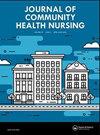正确洗手和戴口罩训练对心脏病患者新冠肺炎恐惧和焦虑的影响
IF 0.9
4区 医学
Q4 NURSING
引用次数: 1
摘要
摘要目的本研究旨在确定正确洗手和戴口罩训练对心脏病患者新冠肺炎恐惧和广泛焦虑的影响。方法随机对照实验研究,分为干预组和对照组。设计该研究(三盲)于2020年8月11日至11月17日在土耳其西部一家三级医院的心脏病诊所进行。研究前的样本量计算为,在80%强度、0.05显著性水平和0.60影响量下,每组的最小样本量为45。112名符合标准的志愿者被纳入研究。干预组(n=50)和对照组(n=53)共有105人完成了这项研究。研究后强度为(1-β)=1。本研究分五个阶段进行:(1)数据收集,(2)随机化,(3)提供培训,(4)一个月后联系干预组和对照组进行随访,以及(5)随访数据收集。结果为心脏病患者提供的训练增加了正确的洗手技术(U=36.00;p<0.001)和正确的戴口罩技术(U=99.00;p>0.001),并减少了新冠肺炎恐惧(U=883.5;p<001)和焦虑(U=751.0;p<0.001)(p<0.05)风险群体。临床证据个人层面的实践培训可用于培训心脏病患者。本文章由计算机程序翻译,如有差异,请以英文原文为准。
The Effect of Correct Handwashing and Mask Wearing Training on Cardiac Patients’ COVID-19 Fear and Anxiety
ABSTRACT Purpose This study was conducted to determine the effect of correct handwashing and mask-wearing training on COVID-19 fear and generalized anxiety in cardiac patients. Methods Randomized controlled experimental study with the formation of intervention and control groups. Design The study (triple-blind) was conducted between August 11 and November 17, 2020, in the cardiology clinic of a tertiary hospital in western Turkey. The pre-study sample size was calculated as a minimum 45 at 80% strength, 0.05 significance level, and 0.60 influence quantity for each group. 112 volunteers meeting the criteria were included in the study. The study was completed with a total of 105 individuals in the intervention group (n=50) and control group (n=53). The post-study strength was (1- β) =1. This study was performed in five stages: (1) collection of data, (2) randomization, (3) providing training, (4) contacting the intervention and control groups for follow-up a month later, and (5) collection of the follow-up data. Findings The training provided to cardiac patients increased the correct handwashing technique (U=36.00; p<0.001) and the correct mask-wearing technique (U=99.00; p<0.001) and decreased COVID-19 fear (U=883.5; p<0.001) and anxiety (U=751.0; p<0.001) (p <.05). Conclusion It can be considered that the training provided to the cardiac patients in preventing COVID-19 may also be suitable for other risk groups. Clinical Evidence Practical training at the individual level can be used to train cardiac patients.
求助全文
通过发布文献求助,成功后即可免费获取论文全文。
去求助
来源期刊
CiteScore
1.40
自引率
10.00%
发文量
21
审稿时长
3 months
期刊介绍:
This innovative publication focuses on health care issues relevant to all aspects of community practice -- home health care, visiting nursing services, clinics, hospices, education, and public health administration. Well-researched articles provide practical and up-to-date information to aid the nurse who must frequently make decisions and solve problems without the back-up support systems available in the hospital. The journal is a forum for community health professionals to share their experience and expertise with others in the field.

 求助内容:
求助内容: 应助结果提醒方式:
应助结果提醒方式:


